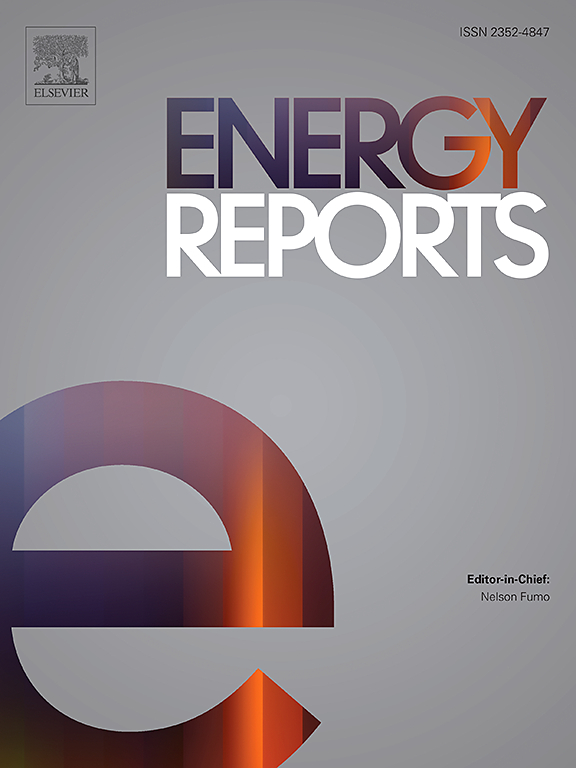Control and optimization of grid-connected inverters for distributed generation using Ziegler–Nichols and Genetic Algorithm
IF 4.7
3区 工程技术
Q2 ENERGY & FUELS
引用次数: 0
Abstract
The increasing integration of inverter-based distributed generation (DG) into modern power systems has heightened the need for advanced control strategies to maintain power quality and ensure efficient grid operation. This study proposes a control and optimization approach for grid-connected inverters for DG systems using Genetic Algorithms (GA), with performance benchmarked against the conventional Ziegler–Nichols (Z-N) method. A proportional–integral (PI) current control strategy is developed and formulated as a constrained multi-objective minimization problem, where controller gains are optimized using weighted objectives based on the Integral Time Absolute Error (ITAE), to enhance tracking accuracy, dynamic performance, and system stability across varying operating conditions. The system computes reference currents from active and reactive power generated by the DG’s, enhancing dynamic response and adaptability. It is validated under different power injection scenarios in single and dual-inverter DG configurations. The simulation results showed an improvement in the tracking efficiency of using GA, surpassing achieved with Z-N tuning. ITAE values for the GA-based direct quadrature axis PI controllers are and 0.151923, with steady-state errors of and, and a settling time of. In contrast, Z-N yielded higher ITAE values (1.76578 and) and a longer settling time of . FFT analysis shows negligible voltage distortion (0.00 %) and reduced current total harmonic distortion (0.22 % with GA, 1.98 % with Z-N), meeting IEEE 519–2014 and IEC 547 standards. The findings confirm that GA-based optimization significantly improves tracking, control accuracy, and power quality over conventional Z-N tuning, providing a robust solution for inverter control in grid-connected DG systems.
基于Ziegler-Nichols和遗传算法的分布式发电并网逆变器控制与优化
基于逆变器的分布式发电(DG)越来越多地集成到现代电力系统中,这增加了对先进控制策略的需求,以保持电力质量并确保有效的电网运行。本研究提出了一种利用遗传算法(GA)对DG系统并网逆变器进行控制和优化的方法,并以传统的Ziegler-Nichols (Z-N)方法为基准进行性能测试。一种比例积分(PI)电流控制策略被开发并制定为约束多目标最小化问题,其中控制器增益使用基于积分时间绝对误差(ITAE)的加权目标进行优化,以提高跟踪精度,动态性能和系统在不同操作条件下的稳定性。系统从DG产生的有功和无功功率中计算参考电流,增强动态响应和适应性。在单逆变器和双逆变器DG配置的不同功率注入场景下进行了验证。仿真结果表明,遗传算法的跟踪效率提高了99.502%,超过了Z-N调谐的90.135%。基于ga的直接交轴PI控制器的ITAE值分别为0.205333和0.151923,稳态误差分别为0.7和0.8,稳定时间为0.00526s。相比之下,Z-N的ITAE值更高(1.76578和1.65952),沉降时间更长(0.008005s)。FFT分析显示,电压畸变可忽略不计(0.00 %),电流总谐波畸变降低(0.22%,Z-N),符合IEEE 519-2014和IEC 547标准。研究结果证实,与传统的Z-N调谐相比,基于遗传算法的优化显著提高了跟踪、控制精度和电能质量,为并网DG系统中的逆变器控制提供了一个强大的解决方案。
本文章由计算机程序翻译,如有差异,请以英文原文为准。
求助全文
约1分钟内获得全文
求助全文
来源期刊

Energy Reports
Energy-General Energy
CiteScore
8.20
自引率
13.50%
发文量
2608
审稿时长
38 days
期刊介绍:
Energy Reports is a new online multidisciplinary open access journal which focuses on publishing new research in the area of Energy with a rapid review and publication time. Energy Reports will be open to direct submissions and also to submissions from other Elsevier Energy journals, whose Editors have determined that Energy Reports would be a better fit.
 求助内容:
求助内容: 应助结果提醒方式:
应助结果提醒方式:


